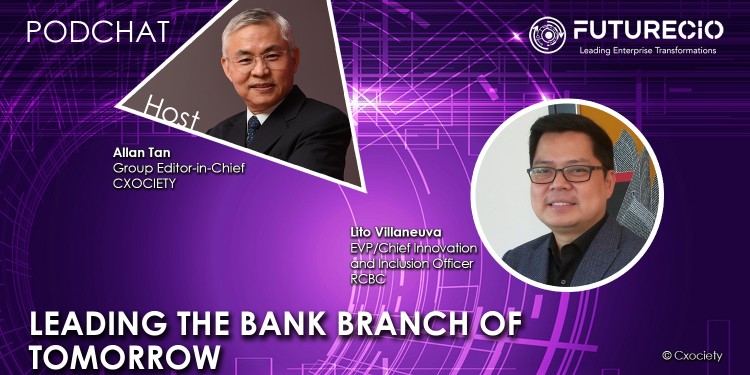The geographic fragmentation of the Philippines with its 7,100 islands has been a decades-old, insurmountable challenge for banks in the country, which seek to expand their branch network into far-flung areas.
More than 18-months into the COVID-19 pandemic, lockdown and physical distancing measures have caused a massive drop in physical transactions but the volume of online transactions went up exponentially as previously recalcitrant customers had to bend their will to circumstances beyond their control. Do banks finally find the answer to the conundrum posed by the Philippines’ challenging geography, as digital banking diminishes the need to establish physical bank branches?
In an exclusive interview with FutureCIO, Lito Villanueva, executive vice president and chief innovation and inclusion officer at RCBC, is optimistic about digital banking adoption in the country.
“Bank branches have definitely been diminished in favour of digital banking and we have seen this. In RCBC, we closed around 66 branches in our network last year, and about 50% to 60% of branch transactions have disappeared because of the pandemic.
“Last year, bank customers were given the chance to try out and assess the value of going digital. And I think the increasing number of digital transactions as shown by data from the Bangko Sentral ng Pilipinas (BSP) is an indication that more and more customers are really adapting to digital. And I think even without COVID 19 or once we achieved herd immunity in the next couple of years, digital transactions will still be sustained in the two-to-three-digit growth rate,” Villanueva said. [Editor’s note: BSP is the Philippine Central Bank].
Retail bank branches to handle hybrid customer engagement
While the pandemic has fast-tracked the digitisation of banking services, Villanueva believes that physical retail banks will not disappear in the short and mid-term but will undergo a transformation to be able to handle a hybrid type of customer engagement. He discounted any notion that physical bank branches will disappear anytime soon.
“We know that especially for wealth management or for investment type of transactions, most of the clients would still want to talk to bank personnel. However, we can speed up the process by automating some of the steps required to accomplish it. That’s why the thinking here is more on you could now come up with a hybrid type of engagement with your customers because again you cannot just push for 100% digital engagement. But there will be cases where you should actually have some sort of a hybrid form of dealing with your customers.”
Villanueva pointed out that effective automation means that the branch must have a good technical know-how of how the process is done so that they're able to troubleshoot every step of the way.
“And, of course, when you talk of digitalisation, it doesn't mean that if for example, the manual process would take about 10 steps you will digitalise the process and still do it with 10 steps. So, how do you now make sure that the process would be seamless, would be frictionless and would be as quick as possible without you compromising the efficiency,” he said.
He stressed: “Reliable customer experience remains a must and the highly skilled staff must be ready to accommodate customer concerns promptly and navigate between digital and in-branch operations.”
Listen to the entire podchat to hear about how RCBC teamed up with local partners from pawnshops, cooperatives to microfinance institutions to reach small communities in various parts of the country – with the goal of onboarding digitally the unserved and underserved sector so no one would be left unbanked. And despite the current lack of infrastructure for internet connectivity, listen to how RCBC seeks to bring retail banking to the level of local mom-and-pop stores by delivering sachet-type products and services.
“And this comes in the form of premium banking services with additional features like telemedicine, Insurtech and microloans at a price that they can afford,” Villanueva said.
Click on the PodChats player to listen to Villanueva’s discussion with FutureCIO on the shape of things to come in the Philippines’ banking sector.




